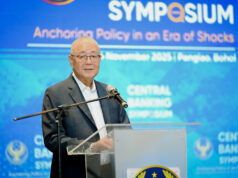TUCP eyes fresh Metro Manila wage hike
By Gillian M. Cortez
Reporter
THE COUNTRY’s biggest labor group plans to ask for an additional raise for Metro Manila’s private sector minimum wage earners, a little more than five months since the last increase took effect, citing “rising costs of food and services” that have rendered the current floor pay “insufficient,” according to an announcement to media on Sunday.
The Trade Union Congress of the Philippines (TUCP) said it will file a petition for an additional P710 in daily minimum wage at the National Capital Region Regional Tripartite Wages and Productivity Board in Malate, Manila at 9 a.m. Monday morning.
That will be on top of the current P500-537 minimum wage rate in the country’s capital that resulted from the P25 increase which took effect on Nov. 22 last year.
The law sets a moratorium of a year from the last minimum wage hike before a new petition is filed and acted on, unless there is a supervening condition that warrants another adjustment.
“Government standards announced by the Philippine Statistics Authority and the National Economic and Development Authority two weeks ago set the minimum amount of P349 a day or P10,481 a month for a family of five to be considered out of poverty,” TUCP said in its announcement, adding “that workers in the highly urbanized region should already be receiving a minimum of P1,247 salary [daily] in order for ordinary workers and their families to live normal and decent lives.”
“The current P537 wage for minimum wage earners in Metro Manila is highly insufficient in the light of rising costs food and services caused by taxes and inadequate government services and social protection assistance to poor Filipinos.”
Sought for comment, Employers Confederation of the Philippines (ECoP) President Sergio R. Ortiz-Luis, Jr. said such a raise would be “definitely inflationary” and force especially small businesses — which make up about 99% of the country’s business sector — to lay off workers.
“… [W]hat employers will do is they will raise their prices or, if the market can’t handle it, they will lessen people,” he said in a telephone interview on Sunday. “It (new minimum wage hike) won’t create jobs; we’ll be losing jobs.”
“You can file for a petition if there is a supervening event like extraordinary inflation,” Mr. Ortiz-Luis added. “But the inflation is getting lower.”
Latest data from the Philippine Statistics Authority show headline inflation easing for the fifth straight month from the nine-year-high 6.7% in September and October last year to clock in at a 15-month-low 3.3% in March, well within the Bangko Sentral ng Pilipinas’ 2-4% target range for 2019 for the second straight month — after 11 straight months of breaching it — though still above the central bank’s flat three-percent forecast average for the year. Headline inflation averaged an on-target 3.8% last quarter.
Taking out volatile prices of food and energy, however, leaves a 3.9% year-to-date core inflation that signals significant inflation pressures persisting across the broader economy.
De La Salle University School of Economics Dean Marites M. Tiongco said in a mobile phone message that “Under the assumption of P710 increase in NCR minimum wage… demand for labor will decrease,” while Rizal Commercial Banking Corp. economist Michael L. Ricafort said in a separate text that “Actual wage hikes affect overall inflation, as well as inflation expectations, also in terms of the effects on prices of affected goods and services in the economy.”
Union Bank of the Philippines, Inc. Chief Economist Ruben Carlo O. Asuncion said via text that the TUCP petition is “understandable” because “[i]nflation impacts salaries; higher prices put upward pressure on wages.”
At the same time, Mr. Asuncion said, “Any upward adjustment on wages has potential impact on price levels in general.”



